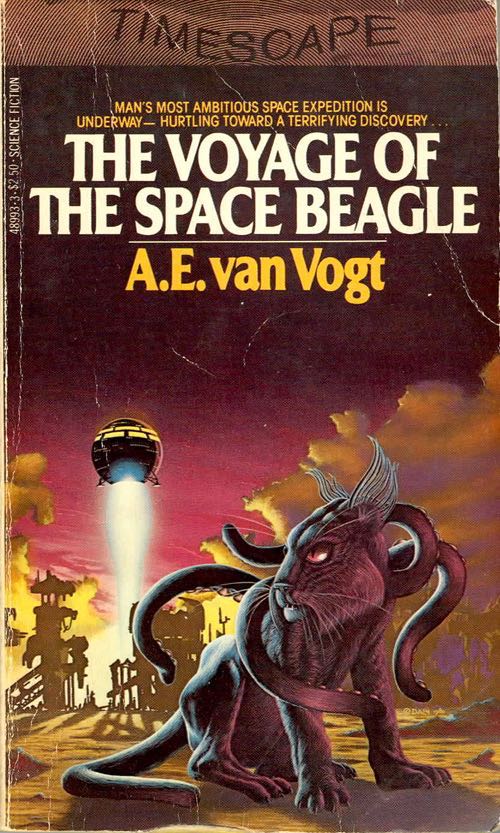The Voyage of the Space Beagle
Reviewed date: 2009 Feb 26
Rating: 2
205 pages
I don't like fixup novels, but The Voyage of the Space Beagle is a classic so I decided to read it anyway. The stories are OK, but not great. The Beagle is a ship full of scientists sent off to explore the galaxy. On board are representatives from every branch of science known to man, including the nascent science of Nexialism.
Elliott Grosvenor is the lone Nexialist aboard Beagle. Although he technically is a department head and rates the same as every other department head, Nexialism is such a new science that nobody on board pays any attention to him. Nexialism is not a science per se, but rather a form of integrated thinking--a method of piecing together knowledge from all the disparate branches of science. With full knowledge of all the data, a Nexialist can make better conclusions and better decisions than a traditional scientist who can only work within the framework of his specialty.
The idea is that the narrowness of each scientific specialty prevents progress because scientists cannot make use of the knowledge in other fields. This is a common theme in early science fiction. E. E. "Doc" Smith uses the idea in his Skylark series, where Dick Seaton absorbs the knowledge from two branches of Norlaminian science, and makes a series of breakthroughs by correlating the two sets of knowledge.
The problem is that studying each branch of science takes time, and humans are mortal. Doc Smith solves that problem with brain-tapes and a machine that feeds information directly into the brain; Seaton effectively reads the complete contents of the minds of two top Norlaminian scientists. In The Voyage of the Space Beagle, van Vogt uses a similar conceit: a sleep machine that educates a person during sleep. Nexialists have learned to use this device to its full potential--eight hours of full, uninterrupted learning each night. Information never has to be repeated; it is remembered perfectly after the first exposure.
And so Elliott Grosvenor the Nexialist is the pinup model of science fiction nerds everywhere: the superscientist. He knows everything, understands everything, foresees everything. He effortlessly manipulates the world and the people around him. He is so confident in his abilities that he prefers to remain a shadowy puppet-master rather than overtly take charge. He does everything out of self-sacrifice and for the common good; the other scientists squabble amongst themselves and would lead the Beagle--and all mankind--to destruction were it not for the benevolent but implacable hand of Elliott Grosvenor.
Van Vogt never appears to consider whether Nexialism could be used for evil, or what horrors a Nexialist might discover by integrating the knowledge from various branches of science. Similarly, Doc Smith's superscientist Seaton achieved nothing but good with his breakthroughs. I wonder if van Vogt or Doc Smith ever thought about what horrors could be unleashed by such scientific leaps forward, or if they had ever read any H. P. Lovecraft:
The most merciful thing in the world, I think, is the inability of the human mind to correlate all its contents. We live on a placid island of ignorance in the midst of black seas of infinity, and it was not meant that we should voyage far. The sciences, each straining in its own direction, have hitherto harmed us little; but some day the piecing together of dissociated knowledge will open up such terrifiying vistas of reality, and of our frightful position therein, that we shall either go mad from the revelation or flee from the deadly light into the peace and safety of a new dark age.
The Call of Cthulhu, by H. P. Lovecraft
But enough of this commentary. The Voyage of the Space Beagle is a fixup novel composed of four short stories.
Black Destroyer - The Beagle explores a planet and picks up a tentacled panther-like creature called a coeurl. The coeurl kills a bunch of the crew and eats their "id", which turns out to be potassium.
War of Nerves - A race of birdmen launch a mental attack on Beagle. Grosvenor contacts them mentally and asks them to stop, which they do--because they hadn't been attacking, they'd only been trying to make contact.
Discord in Scarlet - The Beagle stumbles upon an alien floating through intergalactic space, so they pick it up and bring it inside. Idiots! The alien grabs people and lays its eggs in their stomachs. Much dying ensues until Grosvenor defeats the alien.
M33 in Andromeda - A galaxy-eating intelligence in Andromeda notices the Beagle and determines to follow it home to Earth and destroy mankind. Grosvenor figures everything out, but political struggles on Beagle thwart his efforts to combat the alien menace. Factions of scientists are all but at war. Grosvenor first tries smoothtalking to convince the crew to adopt his plan; when that fails, Grosvenor the superscientist seizes direct control of the Beagle.
